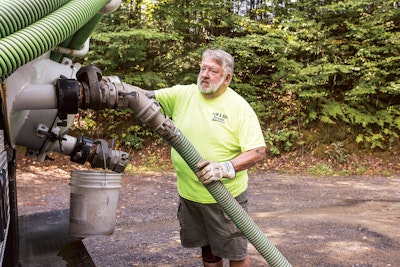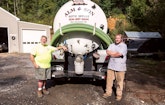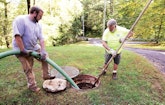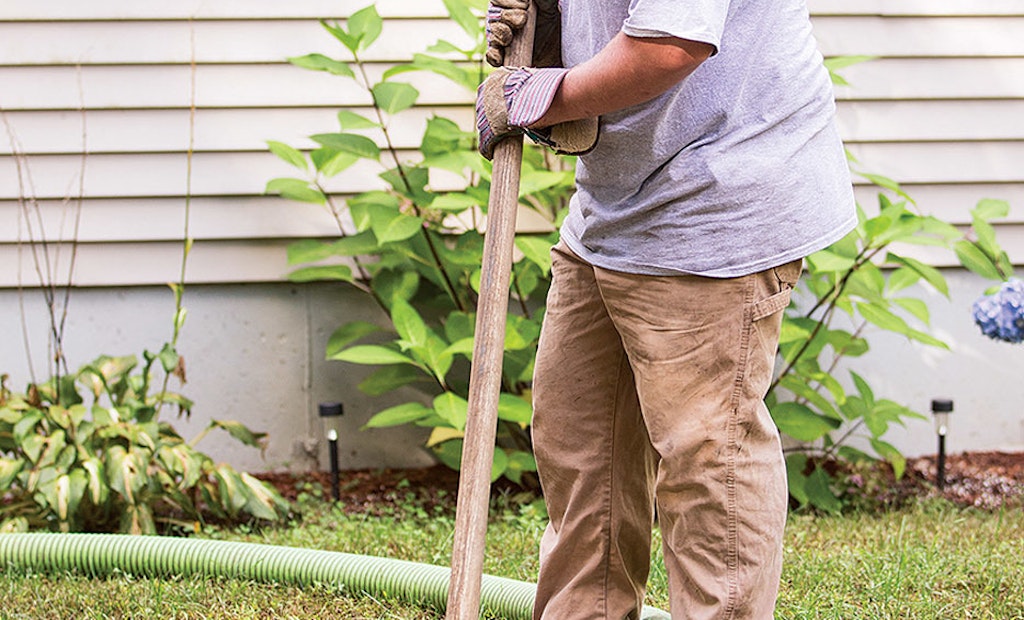Unlike many small-business owners, Karl Alm had a succession plan from the day he launched his septic pumping enterprise in West Brookfield, Massachusetts. “I started Alm & Son as soon as I knew I was having a son,” Alm says. That was in 1994. Wyatt Alm, 24, now works alongside his 62-year-old father.
In the beginning, Karl Alm says he didn’t have much more than the name.
“I bought an old truck with a blown rear end. I nursed it home and put a new rear end in it,” he recalls. “It was enough to get me going. I started on a shoestring. I had enough money to buy the truck, put an ad in the phone book, some decals on the door, and away I went.”
STARTING FROM SCRATCH
A lot of people might go into the septic pumping business by buying an existing business with an established customer base, perhaps from a retiring pumper, but Alm started from scratch. Getting customers wasn’t easy at first. Some came from his phone book ad, and some came from word-of-mouth referrals.
“It was hard,” he says. “The first 5 or 6 years it’s pretty difficult. I scratched, and I dug, and I lived on scraps for a long time.”
He kept his original truck for two years. “It didn’t have power steering,” he says. “My second truck had power steering and a good heater. That was a good upgrade.”
Now Alm & Son Septic Service has three trucks: a 2002 Kenworth outfitted by Osco Tank & Truck Sales with an 3,500-gallon steel tank and a National Vacuum Equipment Challenger pump; a 2001 Volvo outfitted by Lely Tank & Waste Solutions with a 3,300-gallon steel tank and a Jurop/Chandler pump; and a 1993 Ford L7000 outfitted by Dyna-Vac Equipment with a 2,400-gallon steel tank and a Fruitland pump.
He also has a small IHI/Compact Excavator Sales excavator that he uses for septic tank inspections.
The Ford fills a special niche for Alm & Son Septic Service.
“There are a lot of little camps around here where a big rig won’t fit,” Alm says. And, as if there weren’t already enough ways to show that Wyatt Alm was born to be in the pumping business, Karl Alm says, “That’s what my son learned to drive on.”
BORN TO PUMP
Wyatt Alm has always been comfortable with the idea of working in the septic pumping business.
“Back in elementary school, teachers asked everyone what they wanted to do,” Alm recalls. “Everyone gave their typical answers, and I always said I was going to drive a poop truck. They got a kick out of that.”
When Alm was younger, his father also had a large portable restroom business.
“He always had big events,” Wyatt Alm says. “I would go on one of the trucks with him. He would pump them out; I would change toilet paper. We both had our jobs.”
Karl Alm later sold the portable restroom operation. When Wyatt Alm finished high school, he went to work for his father for a couple years, but then he worked in a welding shop for a couple years.
“I decided that wasn’t for me,” Alm says. “This past April, I came back and got my CDL and my Title 5 certification. This was my destiny, I guess. I have no complaints.”
While Alm & Son Septic Service does a little bit of grease pumping and some commercial pumping, including a couple of car-wash pits, about 80 percent of its business is residential. That includes maintenance of septic systems and inspections that are required when a property changes hands, according to a state law known as Title 5.
When the real-estate market is active, as it has been recently, the Title 5 inspections are a significant part of the Alm & Son Septic Service’s business.
“When it’s good and they pass, everybody loves you. If it’s bad and they fail, nobody likes you,” Karl Alm says. “You can tell right away when you open up the tank if it’s been regularly pumped or it’s been neglected.”
SEPTIC 101
Alm has come to the conclusion that homeowners are blissfully ignorant about how their septic systems work. “Most people are under the assumption that it takes two or three years to use 1,500 gallons,” he says. “If you’ve got three teenagers, you do that in about two weeks.”
He says he often gives the customers what he calls septic 101, a basic lesson about how their system works. “The septic tank fills up in a month,” he says. “Once it fills up, if 6 gallons go into the tank, 6 gallons go out.”
Along the way, he learned an analogy that seems to help his customers understand their septic systems.
“An old guy who taught me the ropes would say a septic system is like a wood stove,” Alm says. “Every time you flush the toilet, you’re loading the stove with some wood. The chimney is like your leachfield. That’s where the smoke goes and the graywater goes out. Like every wood stove, you’ve got to take the ash off the bottom, and that’s like the sludge at the bottom of the septic tank. You’ve got to take the dead material out.”
Alm says the image seems to works with his customers because they understand how wood stoves work. “They can relate to the wood stove,” he says. “A lot of them have wood stoves. Almost everybody out here has a septic system, too, but they don’t know the first thing about it.”
There are five water treatment plants within 15 miles of the Alm & Son Septic Service shop, which is about 70 miles west of Boston. The plants are in North Brookfield, Spencer, Barre, Warren and Ware. One of them has a quota for the amount it can accept from septic pumpers, but Alm says he just calls in the morning if he thinks he’ll be using that plant.
Alm tries to work within a 25-mile radius of his shop. It’s not just for convenience. Some states give septic haulers statewide licenses, but Massachusetts is not one of them. “You have to get a septic hauler’s license in every town,” he says. “They go anywhere from $50 to $300.”
Even staying within a 25-mile radius, Alm & Son Septic Service needs to have licenses from 10 to 12 towns. Each issues an annual sticker to pumpers after they pay the fee and submit insurance forms.
DEVELOPING SKILLS
Alm says there doesn’t seem to be many young people in the pumping business, and the ones who are there didn’t start from scratch like he did.
“I’m friendly with all the septic pumpers out this way,” Alm says. “I’ll bet you the average age is in the 50s somewhere. There are not too many young ones. It’s hard to keep help. The few young ones who stick with it, usually their father owns (the business).”
He thinks some people underestimate how much work is involved in pumping, along with the specialized equipment.
“It’s not for everybody,” Alm says. “You’ve got to have it in your blood. There’s a lot of work involved. People think you string out a hose and put the pump in gear, and that’s it. You’ve got to know what to do if something goes wrong. You’ve got to troubleshoot a little bit.”
Early on, he learned that problem-solving was a necessary skill, especially with parts to keep the equipment running.
“You’ve got to fabricate your own parts, and you have to get pretty creative,” he says. “I think the closest place you could get pump parts (when I started) was down in Connecticut, close to Hartford. It’s easier now, when you can go on the computer and punch in a number, and they ship it to you.”
Even so, Alm and his friends in the industry are ready to look out for each other when it comes to replacing parts in a pinch.
“A couple of my buddies, we trade parts off,” he says. “That’s why I try to keep two of everything in the storage room up in the garage. There are always a few parts that wear out faster than others. That way if something goes, you can just come back and replace it, then I’ll buy another one to replace it on the shelf.”
WINDS OF CHANGE
The communication part of the septic pumping business has changed significantly since Alm started.
“A lot of things have changed,” he says. “When I started, there were no cellphones. You had a beeper and a pocketful of change, and you’d stop at a pay phone. There were pay phones all around, and you knew where they were. Now the pay phones are in the antique shop, and the beepers, I don’t think they have them anymore.”
Now that his business and his son have grown, Alm can contemplate his retirement, although he doesn’t expect it will happen right away. He’s proud of the business he’s created.
“You know when it’s something that you always wanted to do, and then you take off with it and you grow it from a seedling, you feel pretty good,” he says.
“My retirement plan is my son,” Alm says. “He was always good at it. Hopefully I’m passing the torch to him, and he can go forward with it. Then I can hang around the office a little bit more. I’ll still help him. I’m too old and stubborn to quit work.”
Good days, bad days
After more than 20 years in the septic pumping business, Karl Alm of Alm & Son Septic Service has a pretty solid idea of what he considers a good day.
“A good day is six tanks,” he says. “Hopefully four of them before noon. The treatment plants around here won’t usually accept anything after about 2:30 p.m. or so.”
He can do that many tanks in a day now that he is working with his son, Wyatt Alm. For a lot of his career, he didn’t have Wyatt Alm’s help, even though the company was named Alm & Son Septic Service from the beginning.
Karl Alm says he generally enjoyed working by himself all those years, but once in a while, something might happen to make him wish he wasn’t alone on the job. That’s a bad day.
“The one day that always sticks in my mind happened when I was new in the business,” he recalls. “This septic tank cover — I think it was a 42-inch cover and probably weighed about 250 pounds — I had it propped up with a shovel. I was pumping the tank, and I hit the shovel and the cover came down. It was leaning up against my back, and I was just in a bad situation where I couldn’t turn around because the cover was so heavy. It didn’t hurt me, but it had me in a situation where I could not move.
“After about an hour and a half, the homeowner came home and lifted the cover off me. That’s why working by yourself, most of the time it’s good, but sometimes it’s good to have somebody else with you.”
He’s careful now not to do things like propping up a septic tank cover on a shovel.
“After you do it for a while, you learn the tricks of the trade: how to get them off and get them on,” he says. “They always go back on easier than they come off.”









